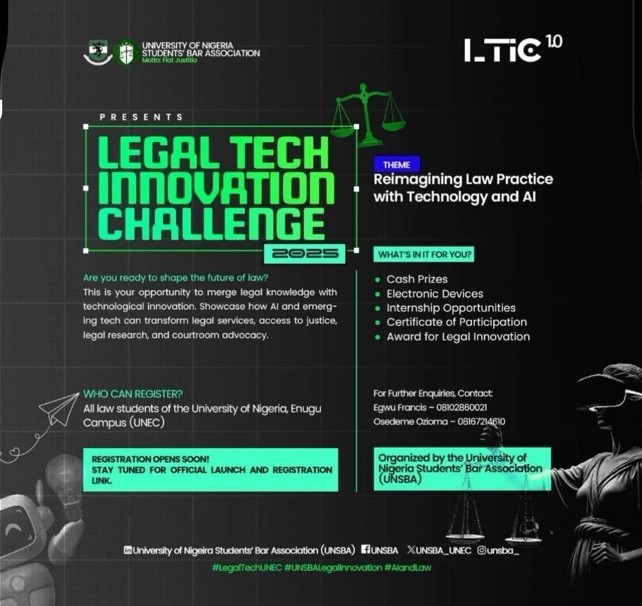Legal Business
Minimum Share Capital Requirement For Companies Under The Nigerian Law

The required minimum share capital of a company is dependent on either the objects of the company, type of company or statutory provisions regulating that company. The primary law on the registration and regulation of companies in Nigeria is the Companies and Allied Matters Act, 2004 (CAMA) while the Corporate Affairs Commission (CAC) is the body empowered to ensure that the provisions of the CAMA are complied with during pre-incorporation and post incorporation stages.
As interesting as it may sound, the CAMA is not the only law that regulates the minimum share capital of a company as there are other laws, policies and regulations that dictates what the minimum share capital of certain companies should be. The CAC being the regulator at the initiation stage must ensure the compliance of companies before issuing a certificate of incorporation.
This article attempts to list regulated business activities and their required minimum share capital. It also discusses the laws and the regulatory agencies that ensure that the provisions of the law are complied with during the post-incorporation stage.
Minimum Share Capital By Category of Company
In this regard, a company’s nature determines its required minimum share capital. In general, the required share capital of companies is set at a very low amount in order to make registration of companies attractive to everyone. Thus it is stated in Section 27 (2) of the CAMA that the minimum share capital of a Private company shall be N10,000 whereas a public company cannot fall below N500,000.
Private Company: N10,000
Public Company: N500,000
Minimum Share Capital By Classification
By virtue of the CAMA, a company can also either be a company limited by shares, an unlimited company or a company limited by guarantee. A company limited by shares is required to have a share capital as earlier discussed whereas an unlimited company which is also required to have a share capital had hitherto and before the act not fallen under the type of companies required to have a share capital.
A company limited by guarantee, however, is not required to have a share capital. This provision is contained in section 26 (2) which states that a company limited by guarantee shall not be registered with a share capital; and every existing company limited by guarantee and having share capital shall, not later than the appointed day, alter its memorandum so that it becomes a company limited by guarantee and not having a share capital.
It is worthy to note that a company limited by guarantee is also defined in the section as a company formed for promoting commerce, art, science, religion, sports, culture, education, research, charity or other similar objects, whose income and property are to be applied solely towards the promotion of its objects and no portion thereof is to be paid or transferred directly or indirectly to the members of the company except as permitted by the Act.
Private Company Limited by Shares: N10,000
Public Company Limited by Shares: N500,000
Private Companies Limited by Guarantee: N0
Public Companies Limited by Guarantee: N0
Private Unlimited Company: N10,000
Public Unlimited Company: N500,000
Minimum Share Capital Of Regulated Objects
There are certain businesses activities and ventures that are regulated by specific laws that provide guidelines for the registration, licensing and regulation of the business activities or ventures. These rules, policies and guidelines place an obligation on promoters of certain types of companies to ensure that the minimum share capital requirement of these types of companies are met. Failure to meet the required share capital will result in the registration being queried by the CAC. The rationale behind setting a higher threshold for certain companies is to provide a means of assurance that in the event of liquidation of the company, the assets of the company will be sufficient to pay a substantial part of any debt owed. This means that any company which purports to carry out the activities under the regulated list whether public or private would not be registered by the Corporate Affairs Commission unless it complies with the minimum share capital requirement by law.
The regulated objects, the enabling law and the post-incorporation regulatory agencies are discussed below for better understanding of the minimum share requirements of the different categories of companies under this umbrella.
- COURIER BUSINESS
By virtue of its power to regulate Courier Business in Nigeria as contained in Section 43 of the Nigerian Postal Service Act, 1992 the Nigerian Postal Service has set its guidelines for registration, licensing and operation of courier companies in Nigeria. The requirements which must be complied with before a courier company can commence operations includes registration of the company with a minimum share capital of N2 Million.
Courier Company: N2 Million
- CAPITAL MARKET OPERATORS
The Securities and Exchange Commission (SEC) is empowered by section 8 of the Investment and Securities Act, 2007 to regulate investment and securities business in Nigeria as defined in the Act. Below are the list of investment companies regulated by the SEC and their required minimum share capital.
Issuing House: N200 Million
Brokers/dealers: N300 Million
Trustees: N300 Million
Fund/ Portfolio Managers: N150 Million
Stock Brokers: N200 Million
Stock Dealers: N100 Million
Inter- Dealer Broker (IDB): N50 Million
Corporate Investment Adviser (Registrar) : N150 Million
corporate Investment Adviser: N5 Million
Individual Investment Adviser: N2 Million
Market Maker: N2 Billion
Consultant Partnership: N2 Million
Consultant Individual: N500,000
Consultant Corporate: 5 Million
Under Writer: 200 Million
Venture Capital Manager: 20 Million
Commodities Exchange: 500 Million
Commodities Broker: 40 Million
Capital Trade Point: 20 Million
Rating Agency: 150 Million
Corporate/Su Broker: 5 Million
- BANKS AND OTHER FINANCIAL INSTITUTIONS
The Central Bank of Nigeria (CBN) is empowered by the Banks And Other Financial Institutions Act, 2004 to regulate the Banking Industry and by virtue of section 2 of the Act, No person shall carry on any business in Nigeria except it is a company duly incorporated in Nigeria and holds a valid banking license issued under the Act.
Through its powers to regulate the banking business, the CBN from time to time make policies relating to the minimum share capital of the type of companies under its purview. Below is a list of the companies and their minimum share capital.
Commercial Bank With Regional Authorization: N10 Billion
Commercial Banks With National Authorization: N25 Billion
Commercial Banks With International Authorization: N50 Billion
Merchant Banks: N15 Billion
Micro Finance Bank (Unit): N20 Million
Micro Finance Bank (State & Fct): N100 Million
Micro Finance Bank (National): N2 Billion
Primary Mortgage Institutions: N2 Billion
Finance Company: N20 Million
Bureau De Change: N35 Million
Non-Interest Banks (Regional): N5 Billion
Non-Interest Banks (National): N10 Billion
- REGISTERED INSURANCE BROKERS
The Nigerian Council of Registered Insurance Brokers is the body empowered in Nigeria to regulate the enrolment and operation of Registered Insurance Brokers. Section 15(1) of the Nigerian Council of Registered Insurance Brokers Act, 2003 empowers the Council to make rules while subsection (1) (a) mandates the council to ensure that a Practicing Insurance Broker business should have a working capital of not less than N5 Million made up of verifiable movable and immovable assets and cash in proportion as the council may decide. Below is a list of insurance-related businesses and their required minimum share capital.
Insurance Brokers: N5 Million
- INSURANCE BUSINESS
The National Insurance Commission Act, 1997 empowers the National Insurance Commission by virtue of section 6 to regulate insurance business in Nigeria. The section provides that the principal object of the commission shall be to ensure the effective administration, supervision, regulation and control of insurance business in Nigeria.
The commission through its powers has issued guidelines regulating the insurance business in Nigeria.
Life Insurance: N2 Billion
General Insurance Business: N3 Billion
Re-Insurance Business: N10 Billion
Life Microinsurance Business: N150 Million
General Microinsurance Business: N200 Million
General Takaful/Family Takaful: N200 Million
- PRIVATE GUARD BUSINESS
The requirements for registration of Private Guard Security Companies are contained in policies made by the Civil Defence Corps made pursuant to Nigeria Security and Civil Defense Corp Act, 2003. According to section 3 of the Act, the Civil Defense Corps (the Corps) has the power to recommend to the Minister the registration of private guard companies. The Corps is also to supervise and monitor the activities of all private guard command and keep a register for that purpose.
Private Security Company/Consultant: N10 Million
- PENSION FUND MANAGERS
The Pension fund business is regulated by the provisions of the Pension Reform Act 2004. The minimum share capital required for Pension Fund business is as follows:
Pension Fund/Asset Custodians: N2 Billion
Closed Pension Fund: N500 Million
Pension Fund Administrators: N1 Billion
- NATIONAL HEALTH INSURANCE BUSINESS
Health Insurance Business is regulated under the National Health Insurance Scheme, HMO Accreditation Guidelines. Under this scheme, the following are the required minimum share capital.
Health Maintenance Organisations (HMOs) (National): N400 Million
Health Maintenance Organisations (HMOs) (Zonal): N200Million
Health Maintenance Organisations (HMOs) (State): N100 Million
- LOTTERY, CASINO AND BETTING BUSINESS
Setting up a lottery business in Nigeria requires compliance with the regulatory authority which is the National Lottery Regulatory Commission. The commission is empowered by the National Lotteries (Amendment) Regulations, 2007. Also, the Lagos State has its own Lottery Regulatory Commission with a different set of permit requirements. Below are the required minimum share capital for Lottery Businesses.
Non-Sports Lotteries: N5 Million
Sport Lottery Businesses: N30 Million + Approval In Principle (AIP).
- AIR TRANSPORT BUSINESS
The air transport business is regulated by the Nigerian Civil Aviation Authority which issues guidelines to the operators in the sector. Section 32 of the Civil Aviation Act gives the Authority the power to regulate and issue licenses to aircraft operators. The Authority from time to time have issued guidelines and directives to airline operators and some of the guidelines relate to the minimum share capital.
Air Transport (International): N2 Billion
Air Transport (Regional): N1 Billion
Air Transport (Local): N500 Million
Air Ambulance/Fumigation/Private Jet: N20 Million
Aerial Aviation Services: N20 Million
Aviation (Ground Handling Services): N500 Million
Aviation (Air Transport Training Institutions): N2 Million
Agents Of Foreign Airlines: N1 Million
- AGRICULTURE BUSINESS
Generally, the agriculture business is not strictly regulated. However, the National Agriculture Seeds Act, 2004 regulates the business of Agricultural Seeds, Productions, Processing And Marketing. The Act establishes a National Agricultural Seed Council and gives it oversight functions over any business, actions, or activities regarding seed development and the seed industry in general including legislation and research on issues relating to seed testing, registration, release, production, marketing, distribution, certification, quality control, supply and use of seeds in Nigeria, importation and exportation of seeds and quarantine regulations relating thereto.
Thus any business relating to seed business is within the purview of the council and the minimum share capital is as stated below:
Agricultural Seeds, Productions, Processing And Marketing: 10 Million.
- SHIPPING AND MARITIME BUSINESS
The maritime business is controlled and regulated by the Nigerian Maritime Administration and Safety Agency (NIMASA) which was created by the enabling law, the Nigerian Maritime Administration And Safety Agency Act, 2007.
By virtue of section 22 of the Act, the agency is saddled with the responsibility of pursuing the development of shipping and regulatory matters relating to merchant shipping and seafarers.
Shipping Company/Agent: N25 Million
Cabotage Trade: N25 Million
Freight Forwarding: 5 Million
Conclusion
Notwithstanding, a company can choose to increase its share capital above the required minimum either at the time of registration or subsequently. However, the same company cannot reduce its share capital below the minimum either at the time of registration or subsequently unless it alters its object clause to exclude the activities requiring the required minimum share capital.
ABOUT THE AUTHOR
Ezra Akintonde is a lawyer with over six years of court room and non-courtroom practice experience. He is seasoned in many areas of law including civil and criminal litigation, business registration, company secretariat services, corporate compliance and the general practice of law.
He has won several cases for his clients both in court and in alternative dispute resolution. He is a writer and has written several legal articles.
CORE PRACTICE AREAS: Civil Litigation, Criminal Defence, Corporate Practice, Divorce & Matrimonial Matters.
Tel: 08063321721
Email: meetmrezra@gmail.com
Legal Business
The Art of Law Firm Leadership: A Conversation with Abayomi Adebayo, Managing Partner at Mavericks & Mages LP

Abayomi Olakunle Adebayo is a distinguished legal expert and strategic leader serving as Managing Partner at Mavericks & Mages LP and founder of MavericksAI. He delivers innovative, client-focused legal solutions across regulatory compliance, corporate governance, complex transaction structuring, and international commercial law. Abayomi combines deep legal expertise with keen business insight to support organizations operating in highly regulated sectors such as financial services, mining, oil & gas, infrastructure, and emerging technologies. As the founder of MavericksAI, the firm’s AI-powered legal automation brand, he champions cutting edge technology to transform legal service delivery. In this exclusive interview with Alaba Ayinuola of Business Africa Online (BAO), Abayomi speaks on his experiences, insights, and perspectives on law firm leadership, deep understanding of the legal industry and passion for innovation. Excerpts.
Alaba: As a managing partner, what are your top priorities for leading and growing Mavericks & Mages LP?
Abayomi: My top priority is to deliver innovative, client-centric legal solutions that align with the dynamic needs of our clients’ industries. Our approach and first strategy to achieving this is to have a deep understanding of our clients’ business models, risk appetites, organizational objectives, and regulatory environments to provide tailored, and strategic legal advisory and corporate governance services.
From a growth perspective, we emphasize speed, scalability, and precision by embedding AI-powered automation within our workflows. This integration boosts operational efficiency, enabling us to respond quickly and accurately while nurturing lasting client relationships. Over the years, we have by this strategy built trusted partnerships with leading organizations across diverse sectors including financial services, fintech, real estate, oil & gas, agriculture, mining, media, and entertainment. Many of our clients have grown substantially, with some progressively evolving into dominant market leaders and conglomerates.
We focus on emerging technologies like AI, robotics, blockchain and DeFi, providing regulatory guidance, licensing support, and compliance advice to innovative companies. Our services include advisory on data privacy, technology and IP protection strategies, and regulatory support for tokenization and digital assets. Additionally, we offer comprehensive transactional assistance, covering due diligence, structuring, and dispute resolution for tech projects. This expertise uniquely positions us to guide clients through the evolving landscape of these emerging technologies.
Alaba: What types of legal issues do you most commonly advise clients on, and how do you approach these matters?
Abayomi: At Mavericks & Mages LP, we specialize in advising clients on a broad range of legal matters, with bias for regulatory compliance, corporate governance, commercial transactions, and intellectual property protection. Our approach is practical and tailored: we take the time to understand your specific industry and regulatory environment, combining deep legal knowledge with strong business insight. This allows us to craft solutions that not only reduce your legal risks but also support your company’s growth and operational objectives.
For example, we guide some of our clients through obtaining and acquiring CBN licenses, managing due diligence, documentation, and regulatory interactions, with ongoing legal support. Our services also cover licensing and compliance for BDCs, finance houses, asset managers, and fintech startups. We provide corporate governance and company secretarial services, protect intellectual property, and conduct legal audits to strengthen compliance.
For international trade, we advise on contracts, payment security, and Incoterms. Additionally, we handle debt recovery, insolvency, restructuring, real estate transactions, dispute resolution, licensing, and representation before regulatory authorities. Our client-focused, tech-enabled approach helps us to deliver timely, compliant legal solutions that foster growth.
Alaba: How do you help clients navigate complex regulatory landscapes, and what strategies do you employ to ensure compliance?
Abayomi: Navigating Nigeria’s complex regulatory frameworks requires diligent monitoring, expert interpretation, and strategic application. We deploy a combination of real-time regulatory tracking, engagement with regulators, and customized compliance advisory that is specific to each client’s sector and business model. Our strategy involves continuous updates on statutory changes, deploying RegTech where appropriate, and conducting risk assessments that are both legal and operational.
We emphasize embedding compliance into business processes as a core strength, not just a checkbox, which enables clients to thrive sustainably while avoiding penalties. Our expertise across sectors like banking, trade finance, energy and agro-allied services ensures we tailor strategies that balance regulatory adherence with business agility.
Alaba: Can you briefly describe a particularly complex corporate governance issue you’ve advised on, and how you approached it?
Abayomi: One noteworthy instance involved advising a client within the financial services sector on board restructuring and compliance with the CBN’s stringent governance framework. The challenge was aligning board composition, ensuring independent directors’ roles, setting term limits, and establishing robust risk and audit committees while respecting existing shareholder dynamics.
Our approach was collaborative and meticulous: we conducted a governance audit, benchmarked against regulatory requirements and best practices, and structured a phased implementation plan. We also facilitated board training on governance duties and compliance. The outcome was a fully compliant board structure that enhanced transparency and corporate accountability, positioning the client to meet regulator expectations and strengthen investor confidence.
Alaba: What are some key considerations for boards of directors in ensuring effective corporate governance?
Abayomi: Effective corporate governance demands board independence, accountability, and clarity of roles. Boards must ensure separation between executive and non-executive responsibilities and engage in regular performance evaluations. Diversity and inclusion are increasingly important, enhancing decision quality and stakeholder representation. Boards should integrate sustainability and ESG initiatives into governance frameworks, aligning operations with environmental and social responsibilities to meet evolving regulatory and investor expectations.
Data security and digital governance, especially in the context of greater virtual meetings and AI adoption, are critical for protecting corporate secrets. Continuous board training and proactive risk management round out these considerations for high-functioning, resilient boards.
Alaba: What are some emerging trends or issues in corporate governance and regulatory compliance that you think are most important for companies to be aware of?
Abayomi: Key emerging trends include integration of AI and digital tools in governance for enhanced board management and compliance tracking. There is also the issue of growing regulatory scrutiny by bodies like CBN, SEC, NDPC, FRC, NAICOM and PENCOM, with stricter enforcement powers such as heavy sanctions, license revocation, and even sacking of boards.
Again, organizations need to understand the increasing importance of ESG frameworks and sustainability reporting as investors and regulators demand accountability for social and environmental impacts. There is also an ongoing push globally for greater boardroom diversity and inclusion, both gender and generational.
Other trends that they must be aware of are adoption of flexible, agile corporate structures that leverage virtual platforms while ensuring strengthened cybersecurity; and rapid evolution of financial and commercial regulations around fintech, digital assets, and data protection, all of which require continuous adaptation.
Alaba: Lastly, how do you see technology and innovation impacting the legal industry, and how is your firm adapting?
Abayomi: This manifests in two key ways: the growing demand for lawyers to leverage technology in their service delivery, and the critical importance of staying abreast of the evolving legal and regulatory regimes driven by innovation and technology.
Undoubtedly, any lawyer will acknowledge that technology is already transforming legal practice, shifting lawyers’ roles toward higher-level strategic tasks. However, this is only the beginning, as lawyers are increasingly recognizing the need to automate routine functions. For example, at Mavericks & Mages LP, through our brand MavericksAI, we lead in integrating AI-powered automation solutions that enable lawyers to work faster, smarter, and with greater accuracy.
Think of those repetitive tasks that consume significant portions of a lawyer’s time – drafting court processes, writing letters and notices, preparing transactional documents and agreements. Our AI Agents can handle these tasks swiftly and precisely, tailored to the lawyer’s preferred style, templates, and formatting, while ensuring data privacy and client confidentiality. This results in more consistent work with fewer errors, freeing lawyers to focus on critical legal strategy and client advice.
We also have AI tools that simplify tasks such as managing board meetings, capturing minutes, and preparing board reports, and improving contract review by identifying risks, key terms, and suggesting enhancements to ensure compliance with Nigerian laws. There are also AI-powered automations that lawyers can deploy to support their law firms in maintaining active online presence through human-in-the-loop automated content creation and social media management that aligns with the rules of professional conduct. They can also use AI for calendar management, regulatory updates, and compliance monitoring to keep their legal teams ahead.
Now, to the other aspect of the question, which is the impact of innovation and technology on legal and regulatory environment. No doubt, rapid technological innovation is creating new legal and regulatory challenges in areas such as data protection, blockchain, digital assets, NFTs, product liability for emerging technologies, and AI-generated content. These developments raise complex issues which require updated regulatory frameworks.
Some countries, including the U.S, have started enacting laws like the Clarity Act and GENIUS Act to address digital asset regulation, In Nigeria we have the ISA 2025 and SEC guidelines for cryptocurrency and digital assets but still need more comprehensive and business-friendly laws. For legal professionals, staying current with these evolving rules is critical. Integrating emerging technology topics into legal education and establishing clear practice directions will help lawyers provide effective, compliant advice while fostering innovation in a rapidly changing environment.
Legal Business
Building a Career in Law: Iguehi Onokevbagbe’s Journey, Insights and Advice

Iguehi Onokevbagbe is a certified Anti-Money Laundering Specialist and seasoned legal professional with over five years of experience spanning corporate law, banking and finance, compliance, and risk management. She has a proven record of delivering strategic legal solutions that enhance governance, mitigate risks, and promote financial integrity. Notably, she played a significant role in Nigeria’s successful defense in the USD 6.6 billion arbitral award case brought by Process & Industrial Developments Ltd. (P&ID), culminating in a favourable judgment by the Commercial Court of London on October 23, 2023. In this exclusive interview with Alaba Ayinuola of Business Africa Online (BAO), Iguehi shares valuable insights, expertise, and latest trends in the field. Exercpts.
Alaba: What motivated you to pursue a career in law, and how did you choose your current practice area?
Iguehi: I have always been passionate about justice and the role of law in strengthening institutions and shaping societies. For me, law is more than rules on paper – it’s a tool to ensure systems function effectively and people are protected. My career at the Central Bank of Nigeria exposed me to the intersection of law, financial regulation, and governance. That experience, combined with my interest in safeguarding integrity and promoting sustainable economic practices, motivated me to specialize in Anti-Money Laundering (AML), compliance, and financial regulation, where I can contribute meaningfully to protecting financial systems and supporting sustainable development.
Alaba: Can you describe your experience with corporate, banking, or finance law during your early career?
Iguehi: I began my career advising on regulatory, corporate, banking, and financial matters, building a strong foundation in compliance and governance. I was later selected to join a three-person technical team working directly with the General Counsel of the Central Bank of Nigeria on complex legal matters. A standout experience was being part of the General Counsel’s team that contributed to Nigeria’s success in the USD 6.6 billion P&ID arbitral case—a complex, multi-jurisdictional matter that enhanced my strategic thinking and resilience. I also served as a member of the committee evaluating consultants for Nigeria’s comprehensive Data Protection Bill, gaining hands-on experience in regulatory drafting and governance reforms. Together, these experiences strengthened my expertise in regulatory frameworks and financial system governance.
Alaba: How has your role evolved over time, and what key milestones have you achieved in your career?
Iguehi: Over time, I have focused on high-impact projects in AML, compliance, and financial system resilience. A key milestone was authoring the chapter Addressing Illicit Financial Flows in Nigeria: The Role of AML/CFT/CPF Frameworks in the book Resilience of the Nigerian Financial System – Legal Issues, Prospects, and Challenges. These experiences have deepened my expertise in compliance, regulatory frameworks, and financial governance.
Alaba: What strategies do you use to identify and mitigate compliance risks?
Iguehi: I approach compliance risk proactively by assessing vulnerabilities, monitoring regulatory changes, and implementing strong controls. Collaboration with teams and regulators ensures solutions are practical and enforceable. Ultimately, effective risk management combines vigilance, clear processes, and a culture of accountability.
Alaba: What leadership skills or experiences have you developed in your career?
Iguehi: Working in high-stakes regulatory environments has strengthened my analytical and strategic thinking, collaboration, and decision-making skills. I have led legal reviews, contributed to cross-departmental policy discussions, and served on committees requiring the balancing of diverse stakeholder interests. These experiences honed my ability to build consensus, communicate clearly, and lead with integrity. To me, leadership is not only about giving direction but also about creating an environment where people feel empowered to contribute their best.
Alaba: How do you see the field of corporate, banking, and finance law evolving in the next 5–10 years?
Iguehi: I see corporate, banking, and finance law increasingly being shaped by technology, data, and global regulation. With AI, fintech, digital currencies, and automated compliance tools already transforming financial systems, AML and compliance frameworks are becoming more complex and data-driven. Lawyers in this space must blend legal expertise with technological literacy to anticipate risks, ensure regulatory compliance, and provide strategic, forward-looking guidance.
Alaba: Lastly, what emerging trends or technologies do you think will have the most significant impact on the industry?
Iguehi: Emerging technologies like AI, blockchain, and digital currencies are already transforming the financial sector, particularly in AML and compliance. AI-driven monitoring and analytics tools enhance risk detection, blockchain improves transparency and traceability, and digital currencies introduce new regulatory challenges. Lawyers who understand both the technology and the regulatory landscape will be best positioned to help institutions navigate these changes effectively.
Legal Business
Lexlytic and UNSBA Launch Nigeria’s First LegalTech Innovation Challenge to Spotlight the Next Generation of Legal Innovators

This Friday, a new chapter in African LegalTech begins. In partnership with the University of Nigeria Student Bar Association (UNSBA), the Nigerian LegalTech Network and Lexlytic-an emerging AI-powered legal intelligence platform, is launching the inaugural LegalTech Innovation Challenge. The one-day event will convene some of Nigeria’s brightest student minds alongside global leaders in law, policy, and technology.
The LegalTech Innovation Challenge will take place at the University of Nigeria on Friday, August 22nd. The event will feature keynotes and lightning talks on emerging trends in LegalTech, including generative AI, regulatory risk, and justice delivery innovation. At its core, the challenge is simple: identify real-world legal and regulatory challenges, and prototype bold, scalable solutions.
The pitch and essay competition has drawn attention for its depth and ambition. Shortlisted finalists will present their ideas to a stellar panel of judges and speakers, including:
- Raymond Blyd, co-founder of Legalpioneer and global leader in legal data transparency.
- Abi Odedeyi, AI strategist building safe, scalable systems for business.
- Fernandez Marcus-Obiene, product and policy powerhouse at the intersection of global tech and law.
- Chiderah Azodoh, Harvard-trained M&A expert guiding startups to $55M+ rounds.
- Iffy Nnabuenyi, infrastructure and fintech lawyer navigating billion-naira deals.
- Geoffrey Nwokolo, counsel at Yellow Card shaping digital asset law across 20 African countries.
- Chizoba Ezeani, founder of ALTIN, bridging the gap between courts and code.
- Chioma Wilson-Dike, Lexlytic co-founder decoding ESG and compliance regulations across borders.
“Innovation in African legal systems is no longer a luxury. It’s a necessity,” said Chioma Wilson-Dike, co-founder of Lexlytic. “Students are closer to the problems than most. We’re giving them the stage to propose answers.”
“We want students to see themselves not just as lawyers, but as builders,” Wilson-Dike said. “This challenge isn’t about theory. It’s about prototypes, partnerships, and policy ideas that could change the way law is practised.”
“This is just the beginning,” said a UNSBA representative. “Legal education is evolving. It’s time our institutions reflected that.”
Backed by Lexlytic’s mission to make regulation more understandable and actionable, the event is the first of many planned across African universities.
Join to attend!
Venue: Google Meet- meet.google.com/snf-mqqu-djh
Time: 2PM WAT (West African Time).
-

 Oil and Gas2 days ago
Oil and Gas2 days agoTotalEnergies, Chevron Push for Faster Permits, Better Seismic Data in Africa
-

 Afripreneur14 hours ago
Afripreneur14 hours agoRevolutionizing Cross-Border Payments in Africa: An Exclusive Interview with Onyinye Olisah
-

 Energy2 days ago
Energy2 days agoUnited States (U.S.) Political Will, African Reforms Signal New Era for Energy Investment

















